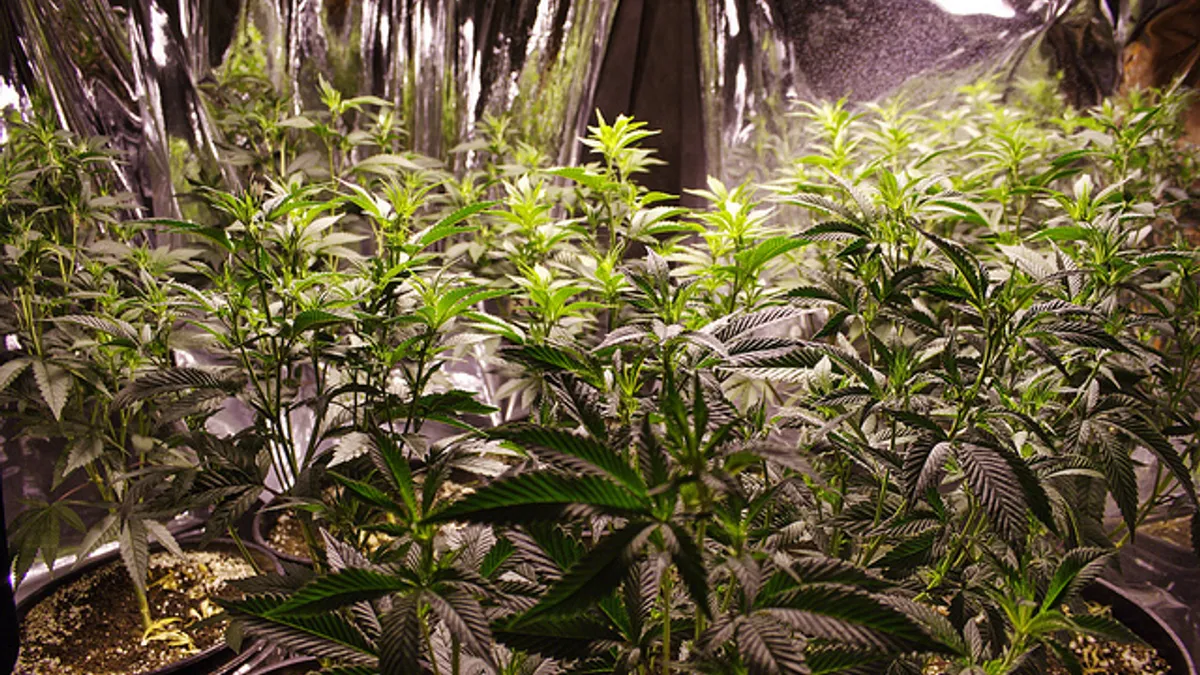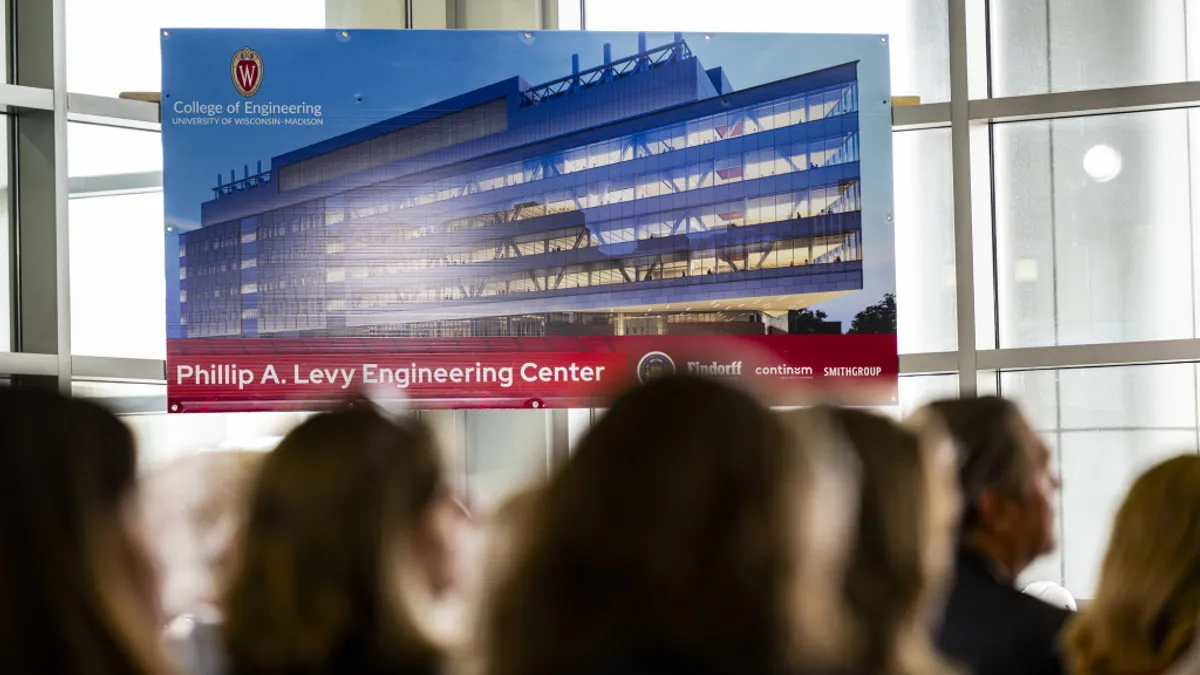The legalization of cannabis — otherwise known as marijuana, in addition to a host of other terms — is a hot-button topic in U.S. politics. Currently, 25 U.S. states have cannabis-use laws on the books, with nine more taking the authorization for either medical or recreational use to the voters in November. Each state that has passed those laws operates in a swirl of its own regulations, all under the shadow of the federal government, which has maintained that marijuana is a Drug Enforcement Agency Schedule I drug, alongside heroin, LSD, ecstasy and peyote.
As laws permitting some use of marijuana continue to spread, the construction industry is left facing contrasting consequences: the positive effect on building demand and housing markets, and the negative effect of safety concerns on the job site.
Budding industry leads to construction boom
Attorney Lance Boldrey of Dykema Gossett told Construction Dive that federal laws can work in favor of the construction industry. Because the business of marijuana cannot be conducted over state lines without risk of a felony charge for trafficking, dispensaries and growing operations must be maintained within the state.
In regions of the country that are limited to what they can grow outdoors because of the weather, this means an enormous increase in industrial construction. The projected need for indoor grow space in Michigan alone, he said, is somewhere between 1.5 and 2 million square feet. "Cities are looking at it as a redevelopment opportunity," Boldrey said.
In Denver, city officials reported in May that there was almost $2.5 billion worth of construction projects either in the planning stages or underway — a building boom partially sparked by the legalization of recreational cannabis. In 2015, marijuana boosted state incomes by $253 million and took over an estimated 4 million acres of grow space, which includes industrial parks throughout the Denver area. Once home to artists and small businesses, a sort of pot gentrification has spread through these formerly low-cost areas, displacing those who couldn't afford the rent.
Marijuana-based businesses — and the people they bring on as employees — also have put pressure on the housing market and driven up home prices to the tune of double-digit increases in Denver. The result? More demand for single-family and multifamily construction.
Architecture and design firms have even seen a payoff from legal cannabis operations. Last November, The McBride Company — the same group that is part of the creative force behind The Walt Disney Company and Universal Studios — revealed its designs for Pineapple Express, a chain of cannabis retail stores. With its "Mystic Pineapple" at center stage — or center store — Pineapple Express founders said in a release that they are ready to "modernize the legal cannabis industry."
Safety concerns on the job site
However, there is a risk for construction companies as well, and that's in the area of safety — whether the cannabis laws have been on the books for years, as in California, or are up for a vote in states like Florida. This year, California has a recreational marijuana measure on the ballot. If passed, the state could see its cannabis market more than triple, from $7 billion to $22 billion.
So the big question remains: If marijuana is legal, can a construction employer forbid its use even on personal time during off hours? The answer from legal experts is a resounding yes. That's where the federal illegality once again comes into play.
According to attorney Todd Wulffson of Carothers DiSante & Freudenberger, there's a disconnect between state and federal positions, which makes the issue confusing for many employers. The reality is, "it's not legal anywhere," he said. "All these states aren't legalizing it. All they're saying is, 'We, as a state, are not going to prosecute you as long as you comply with our laws.'"
Is a zero-tolerance policy the best way to go?
To minimize liability and risk, Wulffson said employers, particularly ones that conduct potentially life-threatening activities like construction companies do, should have a zero-tolerance drug policy as part of their safety programs, even if marijuana is legal on a state level.
Part of the reasoning behind a strict no-use drug policy is the limitations of current testing, according to Tad Devlin, partner at Kaufman Dolowich Voluck. "We don't have that testing capacity with marijuana to determine the level of intoxication," he said. In other words, two people can have the same level of THC — the component that makes someone "high" — with significantly different levels of impairment, which makes trying to determine if someone is fit to operate a forklift or crane all the more difficult.
If the old safety policies are not revised to include the zero-tolerance position, whether it's because the employer is lenient or just overlooked the need, Devlin said it could "create a litigation nightmare … trying to defend the lack of enforcement."
Wulffson said, "California is probably the most employee friendly state in the union," but state courts have consistently ruled that an employer does not have to tolerate marijuana in the workplace, even if there's a medical reason.
Howard Wander, principal partner and COO at Kelley Kronenberg in Florida and chair of the firm's Regulated Substances Practices Group, said the state will most likely embark on the medical marijuana journey after the November elections. He echoed Devlin, Wulffson and Boldrey and said that construction companies need to remember the fact that "federal law is always going to trump everything." Following federal law, he said, is the most conservative and safest road a contractor can take.
Angelo Filippi, partner at Kelley Kronenberg, added that contractors who work on federal projects don't have an option as to whether or not they allow legal marijuana use among their employees. "There is a federal drug-free workplace act that requires that federal contractors establish programs regarding drug-free awareness and create policies that subject employees to termination," he said. "If you want to be a federal contractor, that would require you to have a policy that mandates termination and disciplinary measures."
Florida also has a state-level drug-free workplace policy that is not mandatory, but many employers implement it if only to get discounts on their workers' compensation rates.
'The train's coming' — and firms need to prepare
Some have argued that construction workers should be allowed access to medical marijuana, if recommended by a doctor, under disability laws, but Filippi shot down that notion as well. "The Americans with Disabilities Act, a federal law, does not apply where there is use of illegal drugs," he said. Filippi added that state courts have sided with employers who test and have disciplinary consequences up to and including termination. Therefore, he said he believes that a zero-tolerance policy is the best way to protect employers and employees.
Wander said his firm's Florida construction clients have already consulted on updating their policies and are getting ready for a medical-marijuana "yes" vote in November. The Florida law, he said, more narrowly defines conditions eligible for medical marijuana treatment, and no one anticipates a dispensary on every corner. Still, he said, preparation is key. "The train's coming" he said, "so you're going to have to figure out how to get on it, or you'll get run over by it."





















